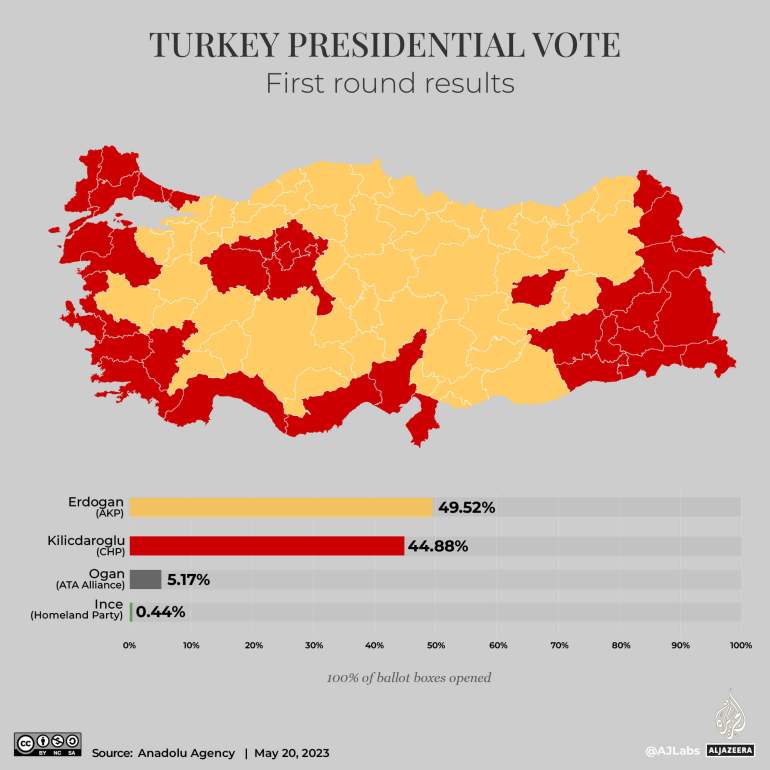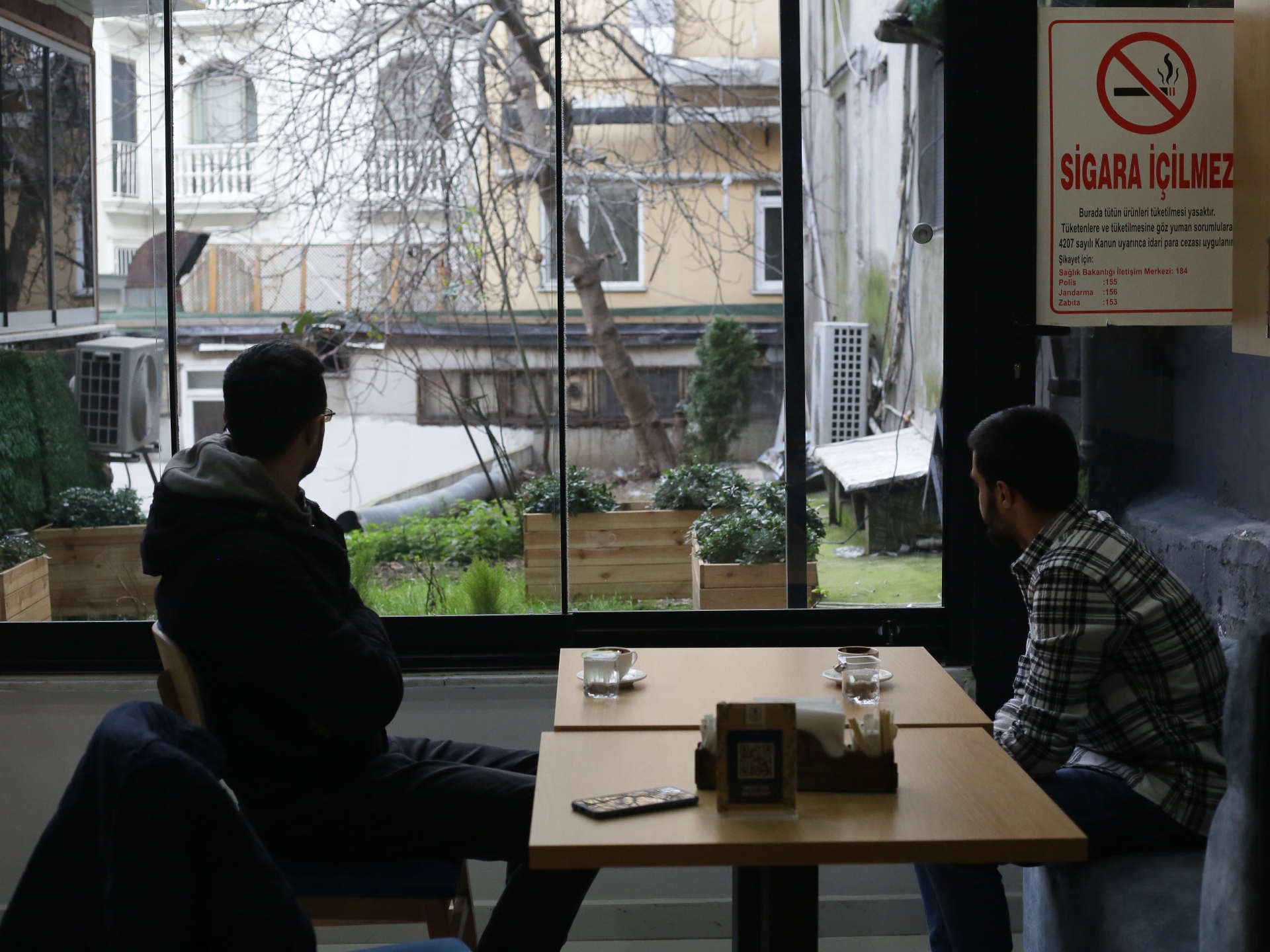Istanbul, Turkey – As Turks prepare to head to the polls for a presidential run-off, millions of Syrian refugees in the country are watching anxiously, uncertain about how the outcome could shape their future.
President Recep Tayyip Erdogan and opposition leader Kemal Kilicdaroglu will face off Sunday in the second round of the vote after neither secured a majority in the first on May 14. Erdogan won 49.5 percent and Kilicdaroglu 44.9 percent.
Immigration has been a central issue in the elections. The campaign has seen several opposition politicians pledging to expel refugees and migrants while the government has highlighted its plans to press ahead with what it calls “voluntarily” repatriations of Syrians.
According to the United Nations, Turkey has taken in 3.7 million refugees, more than any other country in the world. In the year leading up to the polls, pressure grew on refugees and migrants, in particular Syrians, during an economic crisis with soaring inflation, a plunging lira and a deepening cost-of-living crunch.
The situation has left many Syrians in Turkey deeply worried about their future in the country.
“I don’t know what will happen after the election,” said Habib, 23, whose name has been changed to protect his identity.
“They [politicians] say they want to send all Syrians back. We all suffer from anxiety in this period,” said the man who was displaced eight years ago by Syria’s war and currently resides in Istanbul.

Rising nationalism
According to the United Nations refugee agency, the vast majority of refugees in Turkey – 3.6 million – are Syrian living under “temporary protection status”. About 200,000 Syrians have been given Turkish citizenship since the Syrian war erupted in 2011, according to government figures.
While Turkey initially welcomed the refugees, provided shelter and access to education with billions of euros in European Union funding, anti-refugee sentiment has grown in recent years, and refugees have become scapegoats for Turkey’s economic troubles, which has occasionally led to violence.
Muhammad Siddik Yasar, who runs the Tarlabaşı Solidarity Association, a refugee solidarity group in Istanbul, said anti-refugee sentiment sharpened in the run-up to the elections.
“Being a refugee means that you are here today, but you have no guarantee for tomorrow,” he told Al Jazeera.
“People are asking us what to do. They are afraid that racism will increase after the election. I have been working with refugees for many years, and I’ve never seen anything like this year,” he said.
The rising anti-refugee sentiment manifested itself at the ballot box in the first round of the elections as nationalists delivered a strong performance, notably the far-right nationalist presidential candidate Sinan Ogan, who won an unexpected 5.2 percent of the vote.
Ogan ran as the candidate of the ATA (Ancestral) Alliance, led by the anti-migrant, ultranationalist Victory Party. He has since endorsed Erdogan.
“Ogan is an interesting and important phenomenon in Turkish politics,” said Soner Cagaptay, director of the Turkish Research Program at the Washington Institute for Near East Policy.
“He rallied on one issue only, anti-refugee, anti-immigrant platform. With no media access, no rallies and no money basically, he got 5 percent,” Cagaptay said.
Since the first round, Kilicdaroglu, who is backed by a broad coalition of opposition parties, has doubled down on his position regarding deportations.
“Erdogan, you did not protect the borders and honour of our country,” he said last week. “As soon as I come to power, I will send all refugees home.”
‘Voluntary repatriations’
Facing opposition attacks on immigration, the government has pressed ahead with talks with Damascus in what appears to signal a warming of ties.
This month, the foreign ministers of Turkey, Syria and Iran met in Moscow as part of the Kremlin’s efforts to broker a rapprochement between the Turkish and Syrian governments after years of antagonism over Syria’s war and multiple Turkish military operations in northern Syria.
For his part, al-Assad has demanded that Turkey withdraw from the territories under its control in northwest Syria.
The talks were held as several regional leaders have moved to normalise ties with al-Assad. In mid-May, Syria was readmitted to the Arab League after its membership had been suspended for more than a decade.
Kilicdaroglu has said he intends to restore ties with al-Assad while Erdogan has previously said he could meet al-Assad for talks.
Besides moves towards a potential rapprochement, Erdogan’s government has pushed on with its plan for refugees to “resettle voluntarily” in areas in Syria under Turkish security control.
“We have built more than 100,000 houses for [refugees] in northern Syria,” Erdogan said this month at a meeting of young people in his Justice and Development Party (AK Party). “Gradually, Syrian refugees began to settle in these residences.”
“There is no time limit on this issue,” Erdogan added. “We give our best to support and assist them in this regard.”
According to Turkey’s interior ministry, nearly 58,000 Syrians returned to their home country from November 2021 to October last year.
In a 2022 report, Human Rights Watch documented hundreds of deportations from February to July last year, which the government said were voluntary departures.
Many Syrians are wary about the prospect of returning to their home country as the war there continues. Habib said he fears being drafted into the army if he were to return to Syria.
“If I’m transferred to Bashar [al-Assad], I would be in a very critical condition, and my family wouldn’t have anyone to support them,” he said.
Salim Cevik, a researcher at the Centre for Applied Turkey Studies at the German Institute for International and Security Affairs, said there was “no easy and quick solution to Turkey’s migration issue”.
“There is no repatriation policy possible any time soon,” he said. “The more realistic policy would probably find ways to integrate them into Turkish society. But this is something that no politician can say in public.”
Sumber: www.aljazeera.com
 Skip to content
Skip to content


